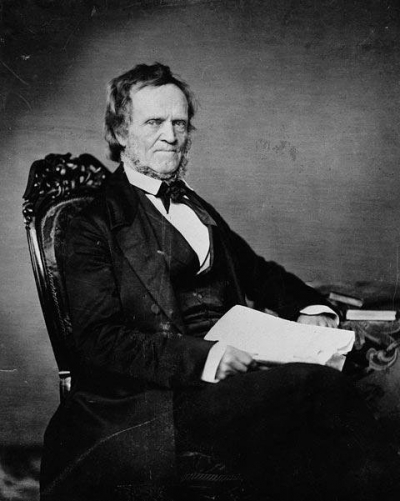The Upper Canada Rebellion was an insurrection against the oligarchic government of the British colony of Upper Canada (present-day Ontario) in December 1837. While public grievances had existed for years, it was the rebellion in Lower Canada (present-day Quebec), which started the previous month, that emboldened rebels in Upper Canada to revolt.
The Upper Canada Rebellion was largely defeated shortly after it began, although resistance lingered until 1838. While it shrank, it became more violent, mainly through the support of the Hunters' Lodges, a secret United States-based militia that emerged around the Great Lakes, and launched the Patriot War in 1838.
Some historians suggest that although they were not directly successful or large, the rebellions in 1837 should be viewed in the wider context of the late-18th- and early-19th-century Atlantic Revolutions including the American Revolutionary War in 1776, the French Revolution of 178999, the Haitian Revolution of 17911804, the Irish Rebellion of 1798, and the independence struggles of Spanish America (18101825). While these rebellions differed in that they also struggled for republicanism, they were inspired by similar social problems stemming from poorly regulated oligarchies, and sought the same democratic ideals, which were also shared by the United Kingdom's Chartists.The rebellion led directly to Lord Durham's Report on the Affairs of British North America, and to The British North America Act, 1840, which partially reformed the British provinces into a unitary system, leading to the formation of Canada as a nation in 1867.
William Lyon Mackenzie (March 12, 1795 – August 28, 1861) was a Scottish-born Canadian-American journalist and politician. He founded newspapers critical of the Family Compact, a term used to identify elite members of Upper Canada. He represented York County in the Legislative Assembly of Upper Canada and aligned with Reformers. He led the rebels in the Upper Canada Rebellion; after its defeat, he rallied American support for an unsuccessful invasion of Upper Canada as part of the Patriot War. Although popular for criticising government officials, he failed to implement most of his policy objectives. He is one of the most recognizable Reformers of the early 19th century.
Raised in Dundee, Scotland, Mackenzie emigrated to York, Upper Canada, in 1820. He published his first newspaper, the Colonial Advocate in 1824, and was elected a York County representative to the Legislative Assembly in 1827. York became the city of Toronto in 1834 and Mackenzie was elected its first mayor; he declined the Reformers' nomination to run in the 1835 municipal election. He lost his re-election for the Legislative Assembly in 1836; this convinced him that reforms to the Upper Canadian political system could only happen if citizens initiated an armed conflict. In 1837, he rallied farmers in the area surrounding Toronto and convinced Reform leaders to support the Upper Canada Rebellion. Rebel leaders chose Mackenzie to be their military commander, but were defeated by government troops at the Battle of Montgomery's Tavern.
Mackenzie fled to the United States and rallied American support to invade Upper Canada and overthrow the province's government. This violated the Neutrality Act, which prohibits invading a foreign country (with which the United States is not at war) from American territory. Mackenzie was arrested and sentenced to eighteen months imprisonment. He was jailed for more than ten months before he was pardoned by the American president Martin Van Buren. After his release, Mackenzie lived in several cities in New York State and tried to publish newspapers, but these ventures failed. He discovered documents that outlined corrupt financial transactions and government appointments by New York State government officials. He published these documents in two books. The parliament of the newly created Province of Canada, formed from the merger of Upper and Lower Canada, granted Mackenzie amnesty in 1849 and he returned to Canada. He represented the constituency of Haldimand County in the province's legislature from 1851 to 1858. His health deteriorated in 1861 and he died on August 28.

1837Nov, 22
Canadian journalist and politician William Lyon Mackenzie calls for a rebellion against the United Kingdom in his essay "To the People of Upper Canada", published in his newspaper The Constitution.
Choose Another Date
Events on 1837
- 24Mar
Black Canadians
Canada gives African Canadian men the right to vote. - 7Nov
Elijah P. Lovejoy
In Alton, Illinois, abolitionist printer Elijah P. Lovejoy is shot dead by a mob while attempting to protect his printing shop from being destroyed a third time. - 8Nov
Mount Holyoke College
Mary Lyon founds Mount Holyoke Female Seminary, which later becomes Mount Holyoke College. - 22Nov
Upper Canada Rebellion
Canadian journalist and politician William Lyon Mackenzie calls for a rebellion against the United Kingdom in his essay "To the People of Upper Canada", published in his newspaper The Constitution. - 25Dec
Battle of Lake Okeechobee
Second Seminole War: American general Zachary Taylor leads 1100 troops against the Seminoles at the Battle of Lake Okeechobee.

 English
English  español
español  français
français  português
português  русский
русский  العربية
العربية  简体中文
简体中文 